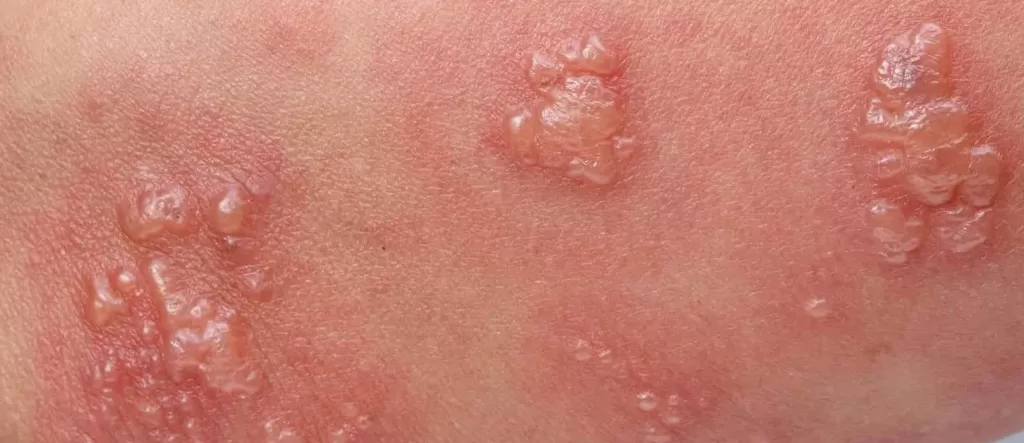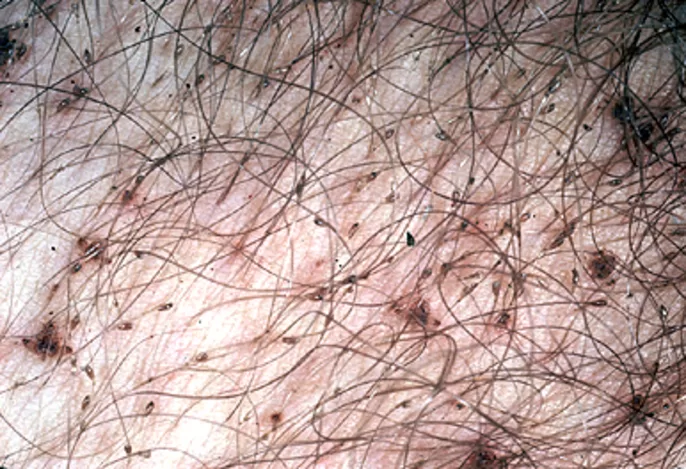It is not unusual for a person’s penis to have a few little bumps or spots on it. On the other hand, a sore that hurts or makes you feel bad is almost always a sign of a deeper illness, like a sexually transmitted infection (STI) or a problem with your immune system. Continue reading to find out more information about the probable causes of penis sores as well as the types of symptoms that should lead you to visit a doctor as soon as you possibly can.
Infections spread by sexual contact
Penis sores can be caused by a number of STDs that are very common. Keep in mind that many of these infections can be spread through close contact or by sharing personal items. Even if you don’t do anything sexual, it might be a good idea to talk to a doctor about the possibility of getting one of these infections.
Genital herpes
Herpes genitalis is an infection of the genital tract that is caused by the herpes simplex virus (HSV). The transmission of HSV is nearly always the result of unprotected sexual contact with a person who previously carried the virus and who is infected with it. This is a possibility whether or not the person has obvious symptoms.
When you have genital herpes, blistering, painful sores that look like scabs can form on the head, shaft, and base of your penis.
In addition, sores can occur on your
- the region of the pubis where hair grows,
- the scrotum, the upper thighs,
- the buttocks, and
- the mouth (if you perform oral sex on someone who has the virus)
Other signs and symptoms of genital herpes include the following:
Blisters that have been popped can leave behind areas of pain, irritation, itching, scarring, or sensitivity.

There is no known cure for genital herpes, but there are treatments that can help control outbreaks, ease pain and suffering, and lower the risk of spreading the virus. These treatments include the following:
- use antiviral drugs like acyclovir (Zovirax) or valacyclovir (Valtrex) and
- washing areas that’s been affected with lukewarm water and a mild soap
- wearing loose cotton clothing such as underwear, slacks, or shorts
- do not wear unwashed underwear
- maintain hygiene after sex
- if alone stay nude and allow fresh air and less sweat
Skin Allergies
Blistering on the penis could also be a sign of a skin allergy. Other symptoms of a skin allergy include itching, pain when urinating, discomfort, and a light red rash. Sweat, certain types of clothes, hygiene products (such as body wash), lubricants, or condoms can all set off a skin allergy in susceptible individuals.
What you should do: It is recommended that you figure out what causes your allergy and stay away from it as much as you can. It might be best for you to make an appointment with a doctor so that your allergy symptoms can be checked out. The medical professional may be able to suggest an antihistamine that will work best for you.
Scabies
Scabies is brought on by microscopic mites that burrow into the skin. There, they will consume the cells of your skin in order to make eggs. Sexual contact that is not protected by protection can spread them, as can being in close proximity to someone who already has them.
Symptoms of scabies include the following:
Irritation, itching, blisters that can get infected, scaly, scabby skin, and white lines where mites have dug into your skin are all symptoms of a skin infestation caused by mites.
In order to treat the infected area effectively, you will need a cream that requires a doctor’s prescription. Scabies is typically treated with a medicated ointment that requires a doctor’s prescription.
Your doctor may also suggest that you take antihistamines like Benadryl (diphenhydramine) to stop the itching or antibiotics to treat any infections that may have developed from open blisters.
Chancroid
Chancroid happens when the bacteria Haemophilus ducreyi gets into your genital tissues and makes them sick. This usually happens when you have sex without protection. This infection causes sores to appear on your penis.
The following are some of the symptoms of chancroid:
- small, tender, and bluish-gray lumps that can be found on the scrotum,
- rough patch or a grey swelling area penis, or surrounding areas.
- wounds that are broken open and discharge fluid or blood.
- discomfort in the area around the sores.
- the discomfort experienced while engaging in sexual activity that involves your penis
- discomfort or pain while urinating
- swelling in the area surrounding your genitalia.
- enlargement of the lymph nodes, which can lead to a rupture of the skin and the formation of an abscess.
The following are some of the treatments for chancroid:
Medications, such as azithromycin (Zithromax) or ciprofloxacin (Cetraxal), to eliminate infectious bacteria and limit the risk of scarring, as well as surgical drainage of pus-filled abscesses.
The following are some of the treatments for chancroid: medications like azithromycin (Zithromax) or ciprofloxacin (Cetraxal) to kill infectious bacteria and reduce the risk of scarring, as well as surgery to drain pus-filled abscesses.
Syphilis
Syphilis is a bacterial disease that is spread through unprotected sexual contact with a person who already has the infection and is carrying the Treponema pallidum germs. A penile sore that is red, round, and painless could be the first sign of syphilis.
In the long run, if it isn’t treated, it can lead to a rash that can spread to other parts of your body, including your chest, hands, and feet. Some of the other symptoms are like
- fever of unknown origin
- enlargement of the lymph nodes
- headache
- Sparalysis
- Blindness
If syphilis is caught early, it can be treated with antibiotics that are taken by mouth. Nonetheless, antibiotics administered intravenously can be necessary for more advanced instances.
Molluscum Contagiosum
Molluscum contagiosum is caused by the introduction of a poxvirus into the skin. The disease can be spread through unprotected sexual activity, direct skin-to-skin contact, or the sharing of personal items (like clothes or towels) with someone who has the virus.
The following are some of the symptoms of molluscum contagiosum:
Pimples that are itchy, red, and painful that form on your penis alone or in clusters of 20 or more open sores caused by scratching have the potential to get infected and spread the virus.
Molluscum contagiosum is a contagious skin disease; however, in some people, it clears up on its own within a few days. Nonetheless, treatment may be necessary for others, including the following:
- To get rid of pimples, you can use creams or ointments that you put on your skin, like podophyllotoxin cream (Condylox).
- Surgical excision of the raised bumps
- cryosurgery to remove the lumps by freezing them off
- laser surgery
Granuloma inguinale
Granuloma inguinale, also called donovanosis, is an infection caused by the pathogenic bacteria Klebsiella granulomatis that can be spread through unprotected sexual activity. This condition will cause open wounds and lesions to appear around your genital area and anus.
There are three stages, and each stage is characterized by a unique set of symptoms:
Stage 1. Little pimples and pink, painless lumps are some of the symptoms of acne.
Stage 2. ulcers that smell bad and are surrounded by rough tissue show up.
Stage 3 includes signs of ulcers that are worsening and possibly leaving scars.
By starting antibiotic treatment as soon as possible, you can make it less likely that the wound will scar for good.
Pubic lice
Pubic lice, sometimes known as crabs, are very small insects that can grow in and feed on the area around your genitals. They are also known to spread disease. They can also spread to other areas of your body with a lot of hair, like your armpits and eyebrows.
Pubic lice can be spread by unprotected sexual activity or through close sexual contact with a person who already has them. They can also be passed from person to person through shared clothing, towels, sheets, or blankets.

The following are some of the symptoms of pubic lice:
- a persistent itching around the vaginal area or the anus that seems to get worse at night
- a low-grade temperature, tiredness, irritation, and bluish areas at the site(s) where you’ve been bitten.
The following treatments might be used to treat pubic lice:
You can get rid of head lice by applying an over-the-counter shampoo or lotion, like one with permethrin, directly to your skin and pubic hair. You can then use tweezers to remove any remaining nits or eggs from your head.
cleaning your home with a vacuum and bleach and hot water and washing all of the clothing, bedding, towels, and other stuff that you have come into contact with.
If home treatments don’t work, you may need to use malathion (Ovide) lotions that you have to get from a doctor.
Lymphogranuloma venereum
Lymphogranuloma venereum, or LGV, is an STD that is spread through sexual contact. It is caused by bugs called Chlamydia trachomatis.
Among the symptoms are:
- genital or anus sores, ulcers, or pimples that have the potential to create scars
- enlarged lymph nodes; rectal discharge; pain in the anus or rectum
- a feeling of being constipated
- Fever
Sometimes sores caused by LGV clear up on their own without the need for therapy. Antibiotics in pill form are typically necessary for treating chronic and painful wounds.
Most of the time, penis sores are a sign of a sexually transmitted infection (STI), but they can be caused by other illnesses as well.
Psoriasis
Psoriasis is a skin condition in which there are too many skin cells on the skin. It is thought that this condition happens when the immune system attacks healthy skin cells by mistake.
The following are common symptoms of genital psoriasis:
- a rash or red pimples around your genital area
- dry skin that irritates and bleeds easily
- itching or discomfort in the area surrounding the affected area
You can try to ease your symptoms at home by doing the following: You can try to ease your symptoms at home by doing the following:
- putting a cold, wet cloth on the affected region will help ease discomfort and irritation,
- you can use topical creams like aloe vera to calm dry skin
If the treatment you are doing at home isn’t helping, your doctor may suggest the following:
- UV light therapy for the treatment of damaged skin
- reducing inflammation with the application of topical corticosteroids
- injections of biologics such as adalimumab (Humira)
- consumption of retinoids such as acitretin (Soriatane)
Behcet’s syndrome
Behcet’s syndrome is a very rare autoimmune disorder that damages the body’s veins and arteries. This will result in sores appearing in many parts of your body, including your genital area.
Other Behcet’s syndrome symptoms include the following:
- sensitivity to the light
- redness and swelling of the eyes or issues with eyesight
- pain in the abdomen in addition to the swelling in the joints
- diarrhea
- headaches
Although Behcet’s syndrome has no known cure, there are a number of drugs that can help manage the symptoms. These are the following:
Ibuprofen (Advil) and other nonsteroidal anti-inflammatory drugs are used for mild flare-ups, and topical corticosteroids are used to reduce inflammation around the sores.
Immunosuppressive drugs such as azathioprine (Imuran) or cyclophosphamide (Cytoxan) to help prevent your immune system from further damaging your arteries and veins. colchicine (Colcrys) to relieve joint pain. immunosuppressive drugs such as colchicine (Colcrys) to relieve joint pain. immunosuppressive drugs such as colchicine.
Eczema
Eczema is the name given to a set of skin disorders that are characterized by an itchy rash. There are many different kinds of eczema, and several of them can affect the penis. Some cases are brought on by stress or the presence of an irritant, while others may not have a definitive cause that can be identified.
An eczema rash is typically characterized by dry, red pimples. When the problem is worse, you might also see blisters that pop and then harden. Moreover, the affected region is typically highly irritating.
You are able to get minor cases of eczema under control by:
- Rubbing a cold, wet cloth on the affected area will help relieve itching, and applying fragrance-free lotion can ease the dryness of the skin.
- If you usually wash your penis with a scented product, you should stop for a few days to see if the scented product is the cause of your symptoms.
If the treatments you try at home don’t work, you should probably see a doctor. They will most likely recommend one of the following treatments:
calcineurin inhibitors like pimecrolimus (Elidel), topical corticosteroids like hydrocortisone, antibiotic creams like mupirocin (Centany), and injectable drugs like dupilumab are some examples of these types of treatments (Dupixent)
The diagnosis as well as the treatment
Taking samples of the fluid that is flowing out of the sore could be necessary in order to diagnose the problem. These samples will be analyzed, so they will be brought to a laboratory.
At this time, blood tests are unable to correctly diagnose chancroid in patients. Your doctor may also check the lymph nodes in your groin to see whether they have swollen or become painful. Because chancroid looks like other sexually transmitted infections (STIs) like genital herpes and syphilis, it can be hard to tell what it is just by looking at it. This is an important point to keep in mind.
Your doctor will give you antibiotics so that you can get rid of the germs that are causing your stomach ulcers. Antibiotics also make it less likely that scar tissue will form around the ulcer when it heals. Based on the treatment that you require, your physician will decide which antibiotics and doses are appropriate for you to take.
It is essential to take your antibiotics as directed by your doctor and to complete the full course of medicine, even if you notice that your sores have begun to improve. This is because bacteria can develop resistance to drugs.

When should one go to the doctor?
No matter what could be causing the sores on your penis, you should get immediate medical attention or go to an urgent care facility if you have signs of a dangerous infection, such as the following:
- painful urination or ejaculation
- fever and chills
- a foul-smelling enacting from the genitals
- painful discharge from the throat
- a feeling of difficulty in breathing tiredness
- diarrhea
- vomiting
It is advisable to have the sore looked at by a doctor, regardless of how small it is, particularly if there is a possibility that it could be a sexually transmitted infection (STI). In the meantime, don’t have any sexual encounters with other people until you figure out what’s causing your sores.
Disclaimer:
This information is for educational purposes only, and no medical advice should be inferred from it. Before changing your diet or adding supplements, please talk to your doctor.
The author’s views are his or her own. The facts and opinions in the article have been taken from various articles and commentaries available in the online media and Eastside Writers does not take any responsibility or obligation for them.
Note: Contact our Writers at www.eastsidewriters.com for writing Blogs/Articles on any niche. We have experts in various domains from Technology to Finance and from Spirituality to Lifestyle and Entertainment.







Pingback: The Benefits and Popularity of Condoms: The Most Widely Used Contraceptive Worldwide - Eastside Writers
Pingback: Silent but Deadly: Unmasking the Menace of Prostate Cancer - Eastside Writers